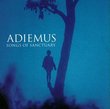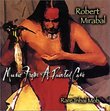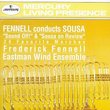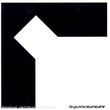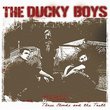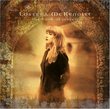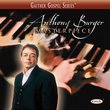| All Artists: Clemens non Papa (Jacob Clement), Tallis Scholars Title: Clemens Non Papa: Missa Pastores quidnam vidistis Members Wishing: 0 Total Copies: 0 Label: Gimell UK Release Date: 10/9/2001 Album Type: Import, Original recording reissued Genres: Pop, Classical Styles: Vocal Pop, Opera & Classical Vocal, Chamber Music, Historical Periods, Classical (c.1770-1830) Number of Discs: 1 SwapaCD Credits: 1 UPCs: 093046227029, 755138101326, 028945491325, 5011728101325 |
Search - Clemens non Papa (Jacob Clement), Tallis Scholars :: Clemens Non Papa: Missa Pastores quidnam vidistis
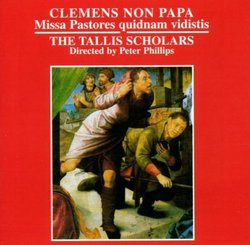 | Clemens non Papa (Jacob Clement), Tallis Scholars Clemens Non Papa: Missa Pastores quidnam vidistis Genres: Pop, Classical
|
Larger Image |
CD DetailsSimilarly Requested CDs
|
CD ReviewsOne more disappointment Igor Goryunov | Russia | 03/15/2006 (3 out of 5 stars) "In spite of the fact that Non-Papa is one of my most favourite Renaissance composer (alongside with Mouton and Crecquillon), I disagree with the previous estimation of this record. The author has mixed up the impression of Tallis Scholars' execution alive with the impression of listening their records. Quite I suppose, that alive execution deserves the highest estimation, but record does not impress at all. It is typical record in English style - flat and lifeless. Practically all executions of English and American ensembles (except for The Hilliard Ensemble) are recorded in this style: S and A are extremely out or range while T and B are practically lost on a back background, as for example in the last 7-parts motet for SSATTBB. As a result the luscious sugar syrup turns out. Having heard to all the records accessible presently in the market of Non-Papa (Gimell, Signum, Loft), Mouton (Harmonia Mundi, Qualiton) and Crecquillon (Arsis), I have understood, that any of them mismatches quality of works of these composers. The hope will remain, that any continental ensemble (The Huelgas Ensemble, Currende, Capilla Flamenca, Dufay Ensemble, Janequin Ensemble) will become interested in their portfolio and will record out really worthy disk. " Adoration FrKurt Messick | Bloomington, IN USA | 06/16/2004 (5 out of 5 stars) "--Clemens non Papa--
Jacobus Clemens, typically called 'non Papa', is one of the best Netherlandish contrapuntalists. Born in 1510, his life is a bit of a mystery. Even the date of his death is uncertain, probably about 1556. We don't even know for certain why he was called 'non Papa' -- it could be to distinguish him from a contemporary pope, Clement VII, or it might be to distinguish him from a contemporary poet named Jacobus (Jacobus Papa). Regardless of these mysteries, there is no doubt that his musical ability was superb, which includes no fewer than 15 masses and a large number of motets. --Motets-- Motets (in this sense) are choral settings of Latin religious texts, generally in four to six voiced parts, sometimes more. The first motet, which serves as inspiration for the Christmas mass that follows on this disc, Pastores quidnam vidistis (Shepherds, tell us...), is scored for five voices. Tribulationes civitatum is a very deeply-voiced motet, ATTB, repeating the phrase Domine miserere. Pater peccavi enlarges to eight voices (not a double choir). The final motet, Ego flos campi, is a unique motet scored for seven voices - SSATTBB. --Missa Pastores quidnam vidistis-- This mass follows as parody of the motet by the same name very closely. Clemens uses very long-length counterpoint, restating the melodies over and over. This is a very 'typical' Flemish mass; Clemens most likely did not study in Italy (as did most of his contemporaries, immediate predecessors and successors), so this is a very 'locally' influenced mass. It is scored for SSATB throughout, with an additional bass voice added at the end for the Agnus Dei.--Liner Notes-- Being internationally acclaimed, the Tallis Scholars' CDs typically present their commentary and texts in English, French, German and Italian (together with any Latin texts, including the text of the mass); that is true of this disc. The cover art also typically represents visual arts contemporary with the compositions - here it is a piece by Hugo van der Goes, the Adoration of the Shepherds.--The Tallis Scholars-- The Tallis Scholars, a favourite group of mine since the first time I heard them decades ago, are a group dedicated to the performance and preservation of the best of this type of music. A choral group of exceptional ability, I have been privileged to see them many times in public, and at almost every performance, their singing seems almost like a spiritual epiphany for me, one that defies explanation in words. Directed by Peter Phillips, the group consists of a small number of male and female singers who have trained themselves well to their task.Their recordings are of a consistent quality that deserve more than five stars; this particular disc of pieces by Clemens non Papa deserves a place on the shelf of anyone who loves choral music, liturgical music or Gregorian chant, classical music generally, or religious music. It is astonishing. The music on this disc was originally recorded in 1987 at the Church of Sts. Peter and Paul, Norfolk." |

 Track Listings (9) - Disc #1
Track Listings (9) - Disc #1